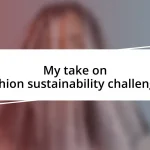Key takeaways:
- Ethical brands prioritize social responsibility, environmental sustainability, and transparency in their practices, allowing consumers to align purchases with their values.
- Recognizing and understanding ethical certifications, such as Fair Trade and GOTS, empowers consumers to make informed decisions that positively impact communities and the environment.
- Supporting local and sustainable brands fosters community development and promotes a circular economy, encouraging collective market change through individual purchasing choices.
- Engaging with brands about their practices can deepen consumer experiences and transforms transactions into shared commitments towards ethical consumption.
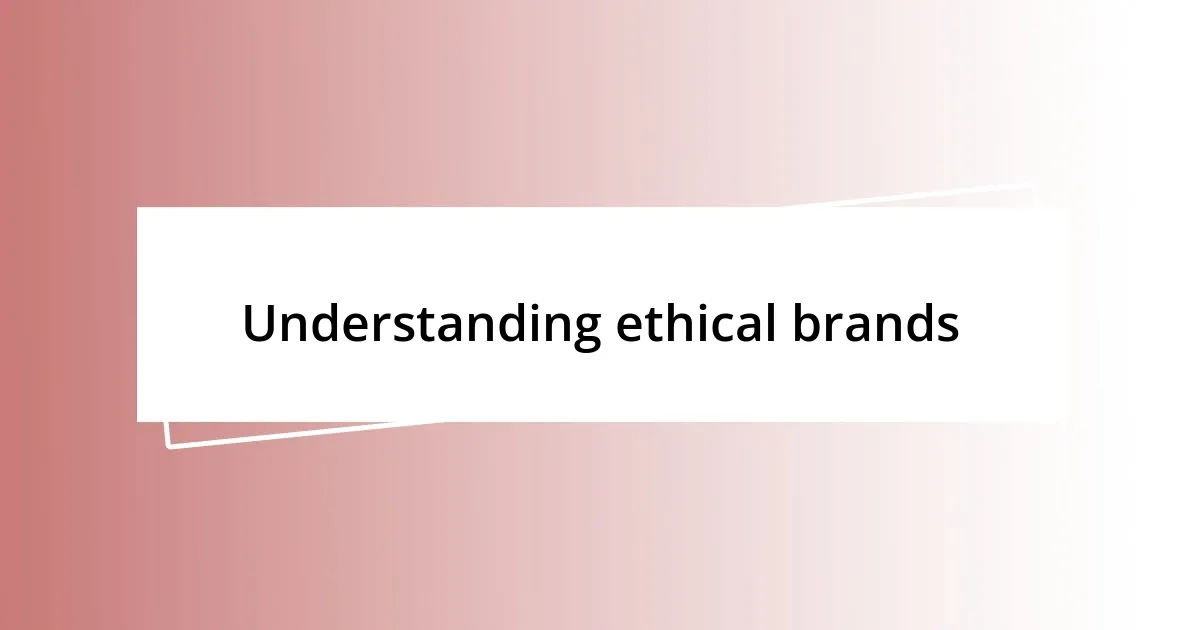
Understanding ethical brands
When I first started exploring ethical brands, I was surprised by how many options were out there. It opened my eyes to the notion that purchasing decisions can actually reflect my values and beliefs. Have you ever stopped to think about where your favorite products come from?
Ethical brands are more than just labels; they embody a commitment to social responsibility, sustainability, and fair trade practices. I remember the moment I switched to a clothing brand that emphasized eco-friendly materials and fair labor. It felt incredibly rewarding to know that my choices supported workers and the environment.
Getting to know ethical brands really made me reconsider what I place value on as a consumer. It’s not just about buying something that looks good; it’s about the story behind the product. Personally, understanding this narrative has driven me to support companies committed to making a positive impact—don’t you think it’s time we all look beyond the surface?
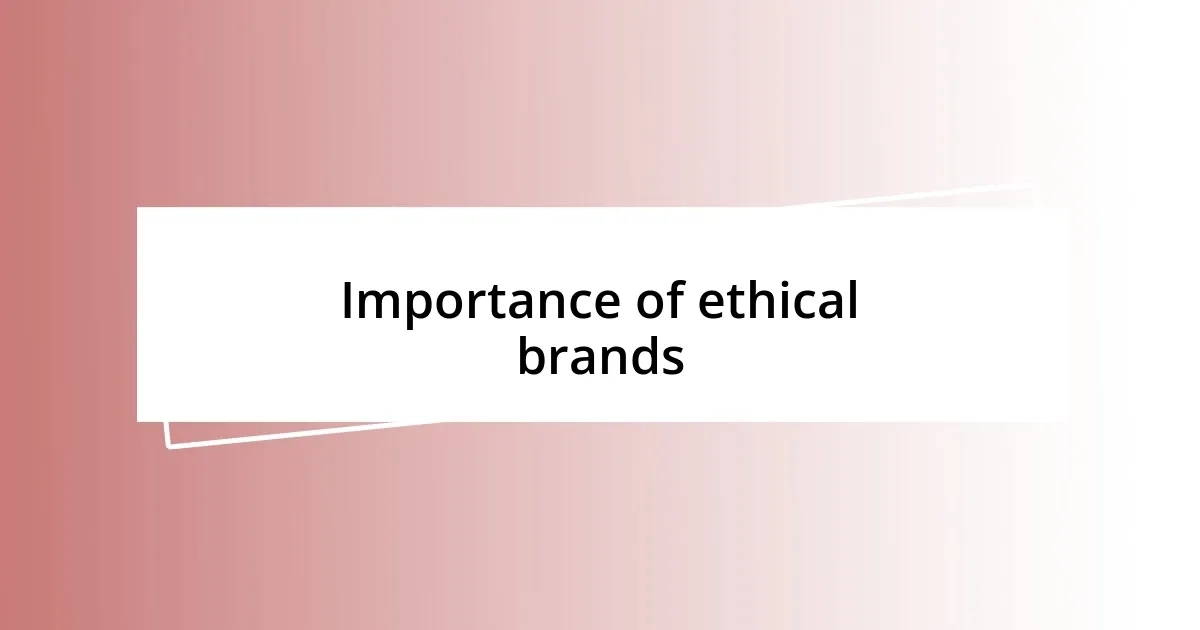
Importance of ethical brands
Ethical brands play a crucial role in transforming consumer habits and promoting a healthier planet. I remember attending a local market where I met artisans selling handmade goods sourced sustainably. Listening to their stories made me realize that every dollar spent on these products supports not just their livelihoods but also the communities they represent. It was a wake-up call about the power of my purchasing decisions.
Here are some key reasons why supporting ethical brands matters:
- Social Responsibility: These brands prioritize fair labor practices, ensuring workers receive equitable wages and safe working conditions.
- Environmental Impact: By focusing on sustainable materials and production methods, ethical brands help reduce pollution and waste.
- Transparency: They are more open about their supply chains, allowing consumers to make informed choices.
- Support for Local Economies: Buying from these brands often means supporting local artisans and economies, fostering community development.
- Consumer Empowerment: Choosing ethical brands allows us to express our values and influence the market toward more responsible practices.
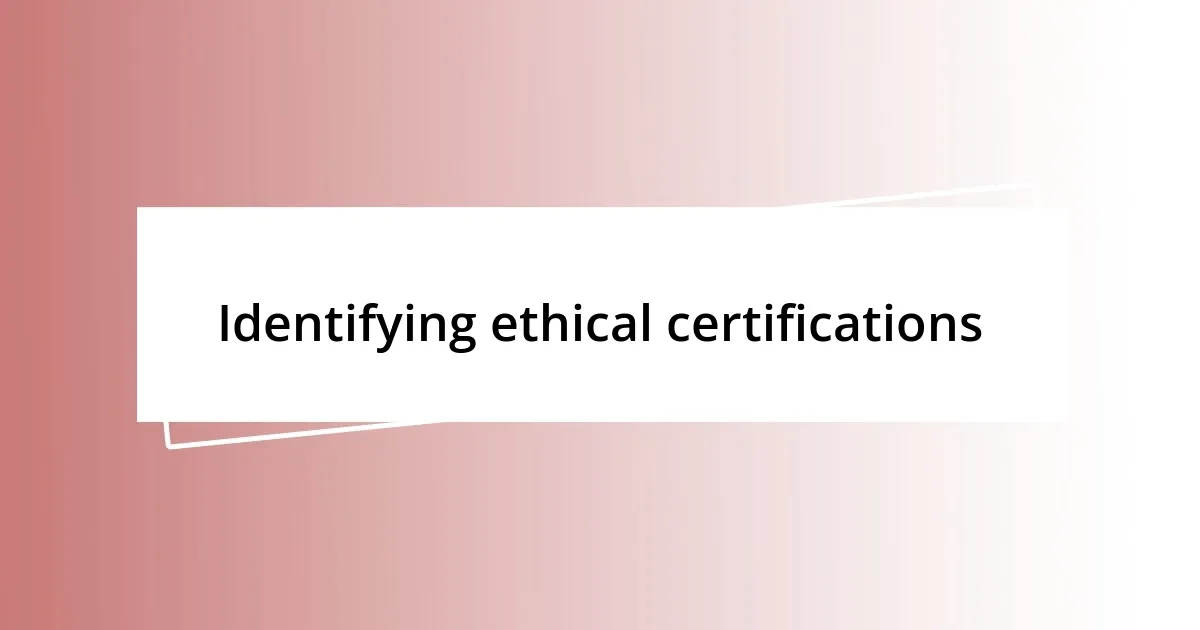
Identifying ethical certifications
Identifying ethical certifications can help navigate the complex landscape of conscious consumption. I often find that these certifications act as the guiding stars for consumers like me, simplifying the process of selecting products that align with my values. For instance, when I see the Fair Trade label, it reassures me that farmers and workers have received a fair wage for their labor. Isn’t it comforting to know that my choices have a positive ripple effect on communities?
These certifications can vary widely in terms of what they guarantee. Some focus on environmental sustainability, while others emphasize ethical labor practices. I recently discovered the Global Organic Textile Standard (GOTS) certification, which not only ensures organic materials but also fair treatment of workers. Learning about such certifications has truly empowered me to make more informed purchases. After all, wouldn’t you prefer to know that your favorite brands are genuinely committed to ethical practices rather than just marketing buzz?
Navigating this landscape requires a bit of homework, but I believe it’s well worth the effort. I often check websites to familiarize myself with each certification’s criteria and values. By doing this, I feel more confident in my shopping choices, knowing they support brands that prioritize ethical practices over profit. Understanding these certifications feels like peeling back the layers of a brand’s story, allowing me to connect with it on a deeper level.
| Certification | Focus |
|---|---|
| Fair Trade | Ensures fair wages and safe conditions for workers |
| GOTS | Guarantees organic materials and ethical labor |
| OEKO-TEX | Checks for harmful substances in textiles |
| B Corp | Measures overall social and environmental performance |
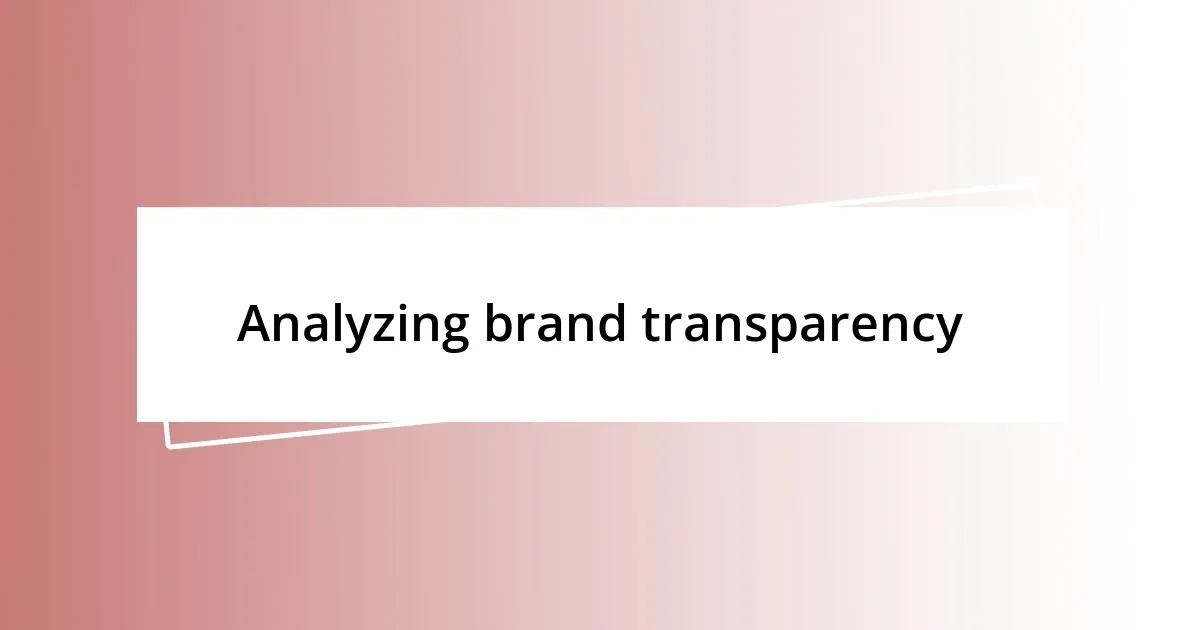
Analyzing brand transparency
When I think about brand transparency, I recall a time I interacted with a company promoting their sustainability practices. They took the time to break down their entire supply chain, showing me where their raw materials originated and how they treated their workers. It struck me how rare such openness is in today’s market—don’t we all deserve to know precisely where our products come from?
I often wonder why many brands shy away from complete transparency. It makes me skeptical when brands dance around the details or only share part of their story. I’ve noticed that ethical brands usually have no qualms about showcasing their practices because they truly believe in their mission. When a company is forthright about their operations, it builds trust. Isn’t trust the foundation of any meaningful relationship—either with people or brands?
Additionally, I recently stumbled upon a brand that published a detailed impact report online. It not only detailed their carbon footprint but also highlighted their successes and areas for improvement. This level of transparency made me feel connected and valued as a consumer. I realized that when brands are honest about their challenges, they are inviting us to be part of their journey. Doesn’t that make you feel more inclined to support them?
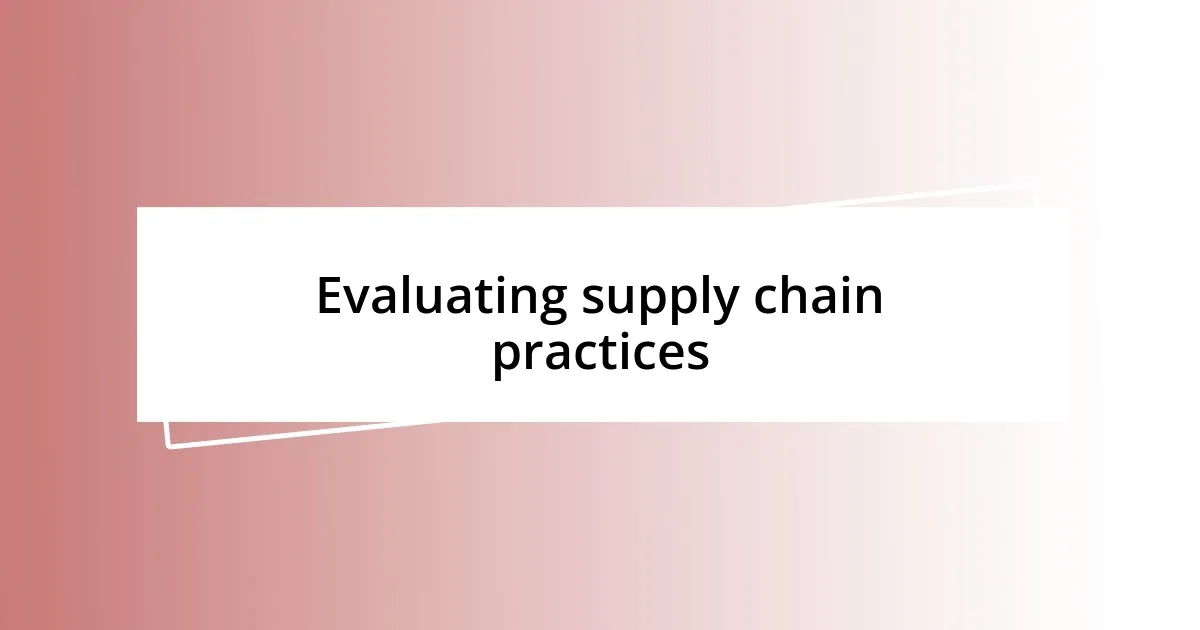
Evaluating supply chain practices
Evaluating supply chain practices is crucial for anyone who wants to ensure their purchases reflect their values. I recall visiting a local workshop where artisans showcased their handwoven goods. It was incredible to learn that each piece had a story, from the sustainable materials to the ethical wages the workers received. Recognizing the full journey of a product gives me peace of mind; it’s like investing in a story rather than just an item.
Lately, I’ve come to realize how essential it is to delve into a brand’s supply chain. For instance, when I look at clothing labels, I search for details about where the fabric is sourced and how the workers are treated. During a recent conversation with a brand founder, they explained their journey towards fair labor practices and eco-friendly materials. Hearing the genuine passion behind their choices made me appreciate their commitment even more. Isn’t it inspiring to support businesses that actively strive for ethical change?
What truly resonates with me is when brands go beyond minimum standards. I once enjoyed a virtual tour of a company that shared how they engage with communities in their supply chain, ensuring voices are heard and respected. This transparency isn’t just about ethical marketing; it’s about real impact. It made me reflect—how often do we pause to consider the origins of our favorite items? By being more mindful of supply chain practices, we can fully embrace the ethical lifestyle many of us aspire to lead.
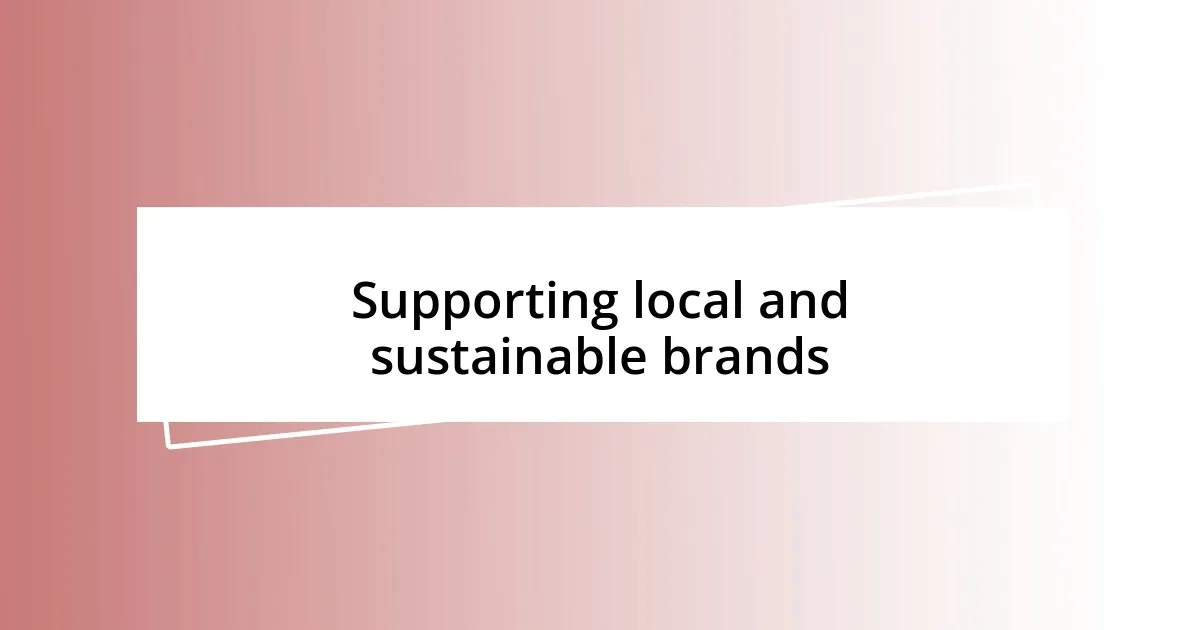
Supporting local and sustainable brands
Supporting local and sustainable brands brings a unique sense of fulfillment. I remember shopping at a farmer’s market where I met a local candle maker. She shared how each candle was made from organic soy wax sourced from nearby farms, which made me realize the impact of every small purchase. Isn’t it amazing how supporting local artisans can contribute to a healthier community and environment?
Recently, I shifted my focus towards brands committed to sustainability. I often find myself exploring small businesses that prioritize eco-friendly practices. I was moved when I visited a local skincare shop; the owner not only explained her sourcing of ingredients but also her efforts to minimize packaging waste. It made me reflect—aren’t we all looking for products that align with our values while promoting a circular economy?
Making the choice to support sustainable brands can feel overwhelming at times. I’ve had moments of hesitation, wondering if my small contributions make a difference. I recall a conversation with a friend who reminded me that collective efforts change the market landscape. Each purchase sends a message—that we value sustainability. Doesn’t it feel empowering to know your choices can inspire change?
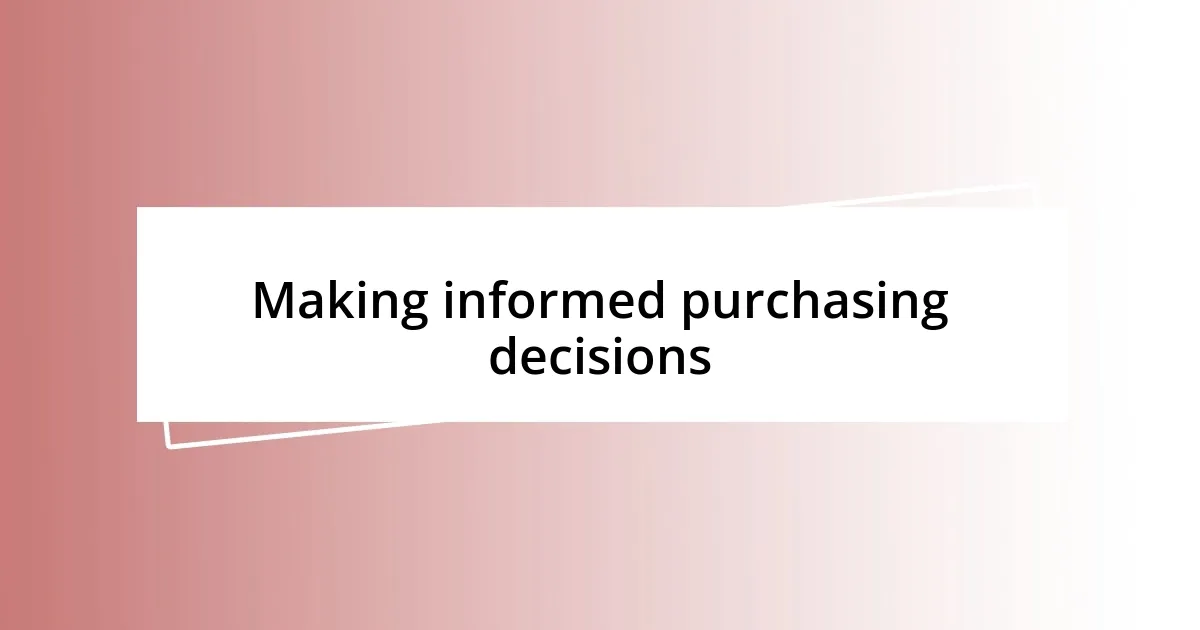
Making informed purchasing decisions
Making informed purchasing decisions requires a blend of research and intuition. I vividly recall a trip to an eco-conscious store where I stood reading the ingredients on a beauty product. The moment I discovered that the brand was transparent about its sourcing practices and held certifications for fair trade, I felt a surge of confidence in my choice. Isn’t it reassuring to know that our bodies absorb what we put on them, making it crucial to choose wisely?
One evening, while going through my wardrobe, I realized how many clothes I owned that didn’t align with my values. I began researching brands that prioritize ethical production and discovered one that donates a portion of its profits to environmental causes. Supporting such initiatives allows me to feel connected to a larger mission. Don’t you think it’s empowering to wear something that represents not just style but also a commitment to making a positive impact?
I’ve learned that engaging with brand stories deepens my consumer experience. I remember reaching out to a company about their ethical practices and being pleasantly surprised by their detailed response. They shared insights into their sustainability journey, which made me feel more invested in their mission. Isn’t it fascinating how a simple question can lead to a wealth of knowledge, transforming a mere transaction into a shared commitment? By actively seeking information, we become advocates for change through our purchasing power.














